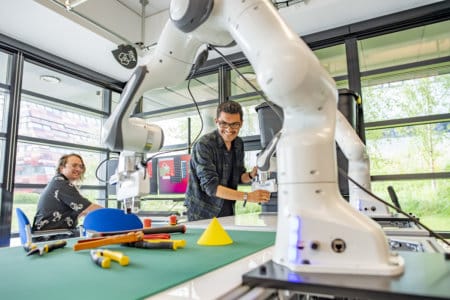
From the Internet and emails to laptops and smartphones, the inventions attributable to computer science have revolutionised the way we live, work and relate to one another. And there is potential still for the study of the theoretical and algorithmic foundations of computers and computing, as well as its hardware and software, and their uses for processing information.
Bill Gates once famously said, “The computer was created to solve problems that didn’t exist before.” He’s not wrong. Computer science professionals possess the ability to address complex organisational challenges with technical solutions. With the right qualifications, they can achieve anything — even help solve some of the world’s most challenging social problems.
The best universities are aware of this and have created programmes to leverage computer science’s potential applications for social good. Whether they are modules or full degree programmes, offerings by these institutions can advance your capabilities to contribute to tackling cases across all 17 of the UN’s sustainable development goals.
Here are four UK universities that are leading this charge:

The School of Electronics and Computer Science is the the leading department of its kind in the country. Source: University of Southampton
University of Southampton
Ranked among the world’s top 100 universities, the University of Southampton is a smart choice for learners who prioritise quality. Programmes at its School of Electronics and Computer Science (ECS) are nothing short of impressive — they are academically rigorous, informed by the latest research and taught by leading academics. Curricula are designed to provide students with a strong foundation in core subjects and opportunities to achieve multidisciplinary excellence through optional modules.
Here, there truly is something for everyone. The school offers a wide range of degrees accredited by the Institution of Engineering and Technology, such as Biomedical Engineering (MEng), Artificial Intelligence (MEng) and Computer Engineering (MEng), among many others.
Of course, those who have yet to determine their professional calling can explore different types of computer science courses before specialising. Each programme has built-in flexibility for students to adjust their path as their studies progress — allowing them to make full use of their time at the school.
The Biomedical Engineering (MEng) has a structure that perfectly demonstrates how seamless progression is guaranteed here. It teaches students to design, build and deliver software programmes and systems, offering pathways in Electronic Systems, Mechatronics for Health, Digital Health and Artificial Intelligence. Throughout, they are guided by academic staff at the forefront of research. In Year 3, they are expected to take on individual special projects. In Year 4, they must work on a real-world group design project alongside a leading academic and an industry customer. Such emphasis on putting knowledge into practice undoubtedly ensures they graduate with in-demand skills.
A dedicated student centre, student hub and personal academic tutors see to their professional development, providing support from orientation to graduation. Tutorial sessions allow students to seek pastoral and academic support. Our thriving student-led societies such as ECSS organise hackathons, careers and technical talks, and social events. We work closely with our extensive network of industry partners to explore your future career, network and take advantage of internship opportunities.
To find out what else the University of Southampton’s School of Electronics and Computer Science can do for you, click here.

University of Glasgow’s School of Computing Science is ranked fifth and sixth in the UK for Computer Science (Times Sunday Times GUG 2022 and The Complete University Guide 2022). Source: University of Glasgow
University of Glasgow
Since 1957, University of Glasgow has been a pioneer in Scottish computing, boasting an esteemed reputation for top-notch computing science research and producing exceptional graduates.
Today, the School of Computing Science stands as one of the UK’s premier institutions, setting the bar high for research and research-led learning and teaching. Notably, it achieved impressive rankings of fifth and sixth in the UK for Computer Science in the Times Sunday Times Good University Guide 2022 and The Complete University Guide 2022, respectively.
Programmes are designed to ensure that students are well-equipped for their future careers, and are taught by researchers who are leaders in their fields. Among the programmes offered are: Computing Science, Computing Science (in partnership with SIT), Electronic & Software Engineering, Information Technology [MSc], Data Science [MSc], Software Development [MSc] and more.
Careers Service provides assistance with career options, CVs, applications, interviews, job searches, work experience, and further study. That’s not all. The school also provides additional services like talks by local employers and interview clinics to help students plan for their careers.

Queen’s University Belfast’s School of Electronics, Electrical Engineering, and Computer Science partners with many major software companies based in Ireland. Source: Queen’s University Belfast/Facebook
Queen’s University Belfast
Queen’s University Belfast is a leader in research and innovation, renowned for producing highly skilled graduates. The School of Electronics, Electrical Engineering, and Computer Science, located in the heart of Europe, benefits from the university’s strategic location with many major software companies based in Ireland. As part of the prestigious Russell Group, the university offers students access to networks, internships, and employment prospects.
The MSc in Software Development is ideal for non-computing graduates seeking to learn the foundations of computing and gain skills to take on a range of roles in the computing industry. These core skills include programming, databases, web development, software engineering and problem-solving. The programme has an extremely high graduate employability rate and is the highest rated MSc computing course for student satisfaction in the UK.
Students pursuing the MSc Artificial Intelligence, MSc Applied Cyber Security, and MSc Data Analytics programmes will gain the skills they need to be job-ready in a rapidly evolving field. The curriculum covers a broad range of applications of AI, including machine learning and other algorithms, allowing students to explore different horizons and expand their knowledge.
To apply their newfound skills, students can access some of the best facilities, including state-of-the-art laboratories for microelectronics, circuits, software engineering, and more. They can practise under the supervision of experienced faculty who provide great support throughout their studies. The institution also offers elite opportunities for learners to excel in their careers. As part of a vibrant community, students here can engage in exciting research projects and collaborate with industry partners, enhancing their skills and knowledge.

Cardiff works with the British Computer Society (BCS) to align degrees with industry demands. Source: Cardiff University/Facebook
Cardiff University
Cardiff University inspires students with contemporary tech-focused degrees in computer science and software engineering, nurturing future leaders in these sought-after fields. Situated in the city’s vibrant and bustling heart, the School of Computer Science and Informatics has established itself as a leading researcher in the field with 95% of students in highly skilled employment 15 months after graduating (HESA data).
It’s not surprising as Cardiff works alongside the British Computer Society (BCS) to ensure that their degrees are relevant to the latest demands from the industry. This is a highly regarded endorsement for potential employers.
Here, the students have access to top-notch facilities, including computer and cybersecurity labs, Makerspace, and IT workshops. They graduate with a profound understanding of computer systems, networks, and programmes, recognising their impact on various aspects of life.
“I fell in love with the practical approach that the course took. As someone who learns through lab work and examples, it seemed the perfect fit for me. Being able to actively program, build and test different systems is always a joy, especially when you have others around you to give assistance if needed,” says Caitlin Burns, a BSc Computer Science student.
Some of the impactful programmes that the school offers are: Computer Science (BSc), Computer Science with a Year in Industry (BSc), Computer Science with a Year of Study Abroad (BSc), Advanced Computer Science (MSc), Computing (MSc), Computing and IT Management (MSc) and more.
*Some of the institutions featured in this article are commercial partners of Study International










